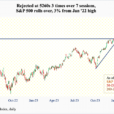Luye Medical, the healthcare arm of Luye Life Sciences, is considering an IPO in Singapore that could raise as much as $500 million (see story). The company has assembled a portfolio of businesses, largely through M&A, consisting of hospitals, clinics and diagnostic services that spreads across China, Australia and Singapore. It is based in Singapore. Luye Pharma (HK: 2186), which is also part of Luye Life Sciences, is the parent’s listed pharmaceutical subsidiary.
ARMO BioSciences (Nasdaq: ARMO), a Bay Area immuno-oncology company, completed a $128 million IPO on the Nasdaq exchange (see story). The shares rose 75% on the first day to close at $29.74. In its Series C-1 funding, completed in August 2017, ARMO raised $67 million led by China investor Qiming Ventures, and joined by new China investors Decheng Capital, Sequoia Capital, Quan Capital and RTW Investments. ARMO’s lead molecule is AM0010, a pegylated form of Interleukin-10, which is currently in Phase III trials as an adjunct to FOLFOX and in Phase I trials as a single agent.
Tmunity Therapeutics, a Philadelphia biopharma developing next-gen immuno-oncology drugs, closed a $100 million Series A round that included Ping An as its first-named investor (see story). Using technology developed at the University of Pennsylvania, Tmunity is developing a broad-based portfolio of T cell therapies for oncology, infectious diseases and autoimmune diseases. Tmunity’s portfolio produces engineered T cells that activate or suppress immunity. Its approaches include T cell receptors, regulatory T cells, Crispr-Cas9 gene editing, allogeneic T cells and bionic T cells, as well as CAR-T programs.
Neuspera Medical, a California neuromodulation company, completed the initial closing of a $26 million Series B round, led by 6 Dimensions Capital (see story). 6 Dimensions was formed in 2017 by the merger of two China-US healthcare investors, Frontline BioVentures and WuXi Healthcare Ventures. Neuspera engineers miniaturized neuromodulation devices using both licensed and proprietary power transfer technologies. Neuspera’s implanted modules are as much as 100 times smaller than its competition, the company says.












Leave A Comment